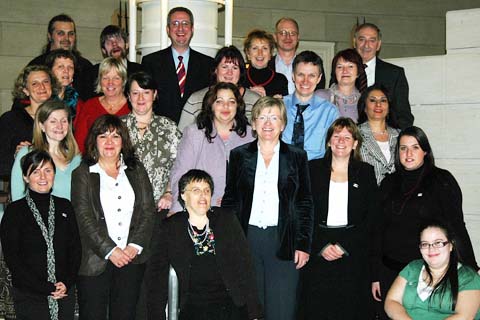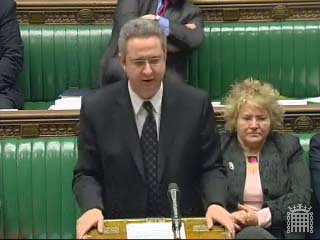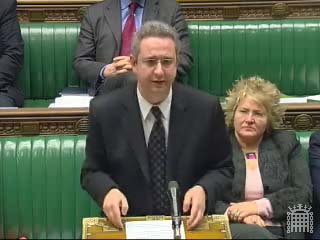Member of Parliament Speaks About
Inclusion and Children with Disabilities
Ivan Lewis, Member of Parliament, spoke in the House of Commons on January 23, 2007 about inclusion and children with disabilities, and referenced the Partners in Policymaking program. A transcript of the speech appears below, transcribed by Jane Myers.
 |
| Partners in Policymaking graduates from the Northwest region of the United Kingdom with Members of Parliament Hilary Armstrong, Minister of State (front row, center) and Ivan Lewis, Parliamentary Under-Secretary, Department of Health (back row, third from left). |
House of Commons January 23, 2007, 9.44 pm
 |
| Mr. Ivan Lewis |
The Parliamentary Under-Secretary of State for Health (Mr. Ivan Lewis): The subject of this debate should unite all parties. We can reflect with some pride on the advances that have been made, but frankly, we still have a long way to go, as the “Every Disabled Child Matters” campaign and the recent parliamentary hearings prove.
We have had a good debate in which many important issues have been raised. I want to begin my speech by paying particular tribute to the work done in this House by my right hon. Friend the Member for Coatbridge, Chryston and Bellshill (Mr. Clarke) and my hon. Friends the Economic Secretary to the Treasury and the Member for Blackpool, North and Fleetwood (Mrs. Humble) in shining a long overdue light on the needs of disabled children and their families. I also pay tribute to the children's charities and carers' organizations and the many individual parents and professionals who have fought for the rights of disabled children over many decades. I recognize, too, that there are Members of all parties who are genuine in their commitment to improving the life chances of disabled children and their families.
Children with disabilities are children first, with the same right to fulfill their potential, and to have a life free of poverty and full of hopes and dreams, as we seek for every child. Parents have the right to expect support that is personalized to their needs and the needs of their child, and a system that exists to provide solutions, not erect barriers. The mother of a disabled child in my constituency summed things up recently when she told me of her experiences: “Why do I have to shout before anyone will listen?” and “I am the expert when it comes to my son” are just two of the comments that struck an all-too-common chord.
The needs of disabled children and their families represent the beginning of my journey to this House.
At the age of 14, I began doing voluntary work for Outreach, a voluntary
organization that still serves my constituents by supporting children with
learning disabilities on school holiday play schemes. I then started to support
adults with learning disabilities on a leisure integration programme. That
became my passion and my career choice. At the age of 19, I set up and ran a small
voluntary organization, Contact, a community care group offering children and
adults leisure opportunities as well as providing respite to families. Contact
still offers support to adults and their families in my constituency.
Through that work, I learned much about myself, but more importantly I learned so much about the realities faced by disabled people of all ages and their families and carers. That taught me the values that are the foundations of my political beliefs, and it makes me proud to have the opportunity in Government to influence, and sometimes shape, change in that regard. I and my ministerial colleagues are strongly committed to policies such as “in Control”, direct payments and individual budgets, which will transfer power and control in the delivery and shaping of services from organizations to those who use services and their families.
So what are the values to which I refer? Every disabled child is an individual with distinct needs, emotions and potential. Every disabled child has a fundamental right to be included as part of their community and our society. I get angry when I hear some politicians and commentators deride inclusion as having failed and as being simply about political correctness, and when they talk only of those parents seeking special or segregated education, and when they talk about disabled children in a patronising, demeaning way.
Of course our system is not yet as good as it needs to be in terms of specialist expertise, sensitivity and resources; the hon. Member for Buckingham (John Bercow) made that point. Attitudes, including among some educationalists, are not always as they should be.
I accept that some parents still feel that special schools are the best available option. In my constituency, I am proud of Elms Bank which was one of the first special secondary schools to achieve specialist status and recently made it into the top 5 per cent. of schools for value added performance, including mainstream schools.
I could also however introduce Members to many parents who have fought against the professionals and the system to demand a mainstream education for their children, and who could describe the thrill of their child's first day alongside their non-disabled brother or sister at the local school, or who have cried themselves to sleep because the local education system has come up with all sorts of reasons why their child has to be excluded from the mainstream system. Those parents deserve to be heard in this debate, and more generally.
The hon. Member for Buckingham, who now has extremely important personal experience, made a fantastic speech which I could not disagree with a word of. He talked about the importance of trained support staff. Our debate should not be about being for or against inclusion; we should recognize that to make a reality of inclusion, which should be the norm for the vast majority of disabled children, we have to get to a situation in which specialist support staff are available to provide the necessary support.
In the context of change, I remember those who vigorously opposed the closure of the long-stay mental handicap hospitals in the 1980s and 1990s. They said that “mentally handicapped” people could not possibly live in the community; that they needed looking after by nurses; that they somehow posed a risk to children. I wish that those people could see today adults with learning disabilities being supported in living in their own homes by organizations such as Outreach and Build, in my constituency. After 30 or 40 years of being locked away in institutions, they live ordinary lives as neighbors, friends and family members in our community. In my current role, and in the aftermath of Cornwall and Orchard Hill, I am determined to ensure that the remaining four hospitals are closed and the residents provided with the support that they deserve in the community.
Change should of course be done properly, for the right reasons and with respect for the needs and preferences of children and their parents, but inclusion is right. Members should reflect on this: how many citizens opt for exclusion from society when given an authentic choice? We need to think about that when we make such policy decisions. Our long-term goal should be to maximize inclusion in education, health, leisure and work and all areas of public policy.
I also want to share with Members my view of Scope's current campaign as it relates to the recent decision to restrict the growth of a disabled child in the United States of America. I am always reluctant to appear in any way critical of parents and the difficult decisions that they make about their children. That is particularly the case when, owing to a serious disability, the parent may feel genuinely unable to establish the view of the child or young person. However, I believe that every child has the right, irrespective of any disability, to grow into an adult physically, and with all the rights and opportunities available to every other citizen. Scope, in my view, is right to make a stand in this country on that issue.
Over the years, much of my personal inspiration has come from examples of battling parents, grandparents and carers: people such as Lynne Elwell, who, following her many negative experiences of the system as the mother of the late Nicola, has created a national network called Partners in Policymaking. I urge Members in all parts of the House to find out more about that organization. Parents and people with learning disabilities participate in training courses, leading to the status of a Partners graduate. Partners in Policymaking empowers parents and disabled people to build their confidence, knowledge and support systems, so that they can fight for their rights as partners, not as adversaries of professionals and the system. I say to my hon. Friend the Member for Blackpool, North and Fleetwood that, in many ways, the best advocates are parents who have themselves been through the system and can represent the interests of other parents. I believe very strongly in building such networks around the country.
When I speak to Raymond, the late Nicola's father, I feel not only the acute pain of his loss, but his enduring anger at the failure of the system on so many occasions during her life. We should also consider people such as Geraldine Green, who is not only a full-time carer for her grandchildren but runs an enterprising local voluntary organization called Hurdles, which offers a range of support for disabled children and their families in my constituency and that of my hon. Friend the Member for Bury, North (Mr. Chaytor). These individuals and, as the hon. Member for South-West Surrey (Mr. Hunt) said in his opening remarks, many others are the heroes whose vision and commitment have been born out of frustration—sometimes anger—at the failings of the system.
I now turn to some of the contributions made by Members. The hon. Member for South-West Bedfordshire (Andrew Selous) talked about the importance of information sharing between agencies to ensure that people get a truly joined-up service. I share that view, but I ask him to reconsider his party's opposition to data sharing on the sometimes spurious ground of civil liberties. On physical restraint, I should also point out that Opposition Members cannot say that they are against targets imposed by central Government, and then ask us to direct every head teacher in every school in the country to do what, frankly, I believe should be regarded in most schools as best practice. The hon. Gentleman is wrong about initial teacher training, which has a significant focus on the requirement to be sensitive to special educational needs, but we can share more information with him on that issue at another time. As a distinguished member of the Work and Pensions Committee, the hon. Gentleman signed up to a report that said that the Government were on target to halve child poverty by 2010, but tonight he has signed up to a motion claiming that that will not be achieved.
The hon. Member for Inverness, Nairn, Badenoch and Strathspey (Danny Alexander)—that is a difficult one at this time of night—made an excellent speech. It was fair, balanced, credible and sensible. He made the important point that the interventions that we make in childhood and the early years do not affect the child only during that period of their life, but their whole life opportunities. He made several other important points.
My hon. Friend the Member for Blackpool, North and Fleetwood was once the chair of a social services committee, as I was, and she made several very important points. Of course we have to grapple with the consequences of demographic change, which means that people thankfully live longer and have fuller lives, but their disabilities can also be more complex and more challenging. She was right to refer to the centrality of the transition from being a child to being a young adult, and the need—as we are now doing across Government—to have that as a standing item on the inter-ministerial group that looks at all matters to do with disabled people. She was also right to draw attention to the fact that key workers should be at the heart of a future system, in terms of guiding parents through all the complex issues.
Andrew Selous: Will the Minister give way?
 |
| Mr. Ivan
Lewis |
Mr. Lewis: I am afraid that I have no time to give way to the hon. Gentleman.
As I have said, the hon. Member for Buckingham made an excellent speech. He speaks with great authority, credibility and integrity on these matters and he does not seek to make cheap party political points. I could not disagree with one single element of the contribution that he made to the debate. I would gently say to him that we do now have a common assessment framework for children for the first time. It is being rolled out across the country and I hope that it will add value and make a difference. The hon. Gentleman mentioned children with autism, and our extension of the child and adolescent mental health services—CAMHS—teams across the country means that we now have more specialist professionals who have expertise in autism and who are able to make assessments at an early stages as part of the CAMHS system.
My hon. Friend the Member for Stourbridge (Lynda Waltho) mentioned cuts being imposed by a Tory council in Dudley on transport for disabled children and voluntary youth services. I urge Opposition Front Benchers to intervene with their colleagues who run that local authority.
In nearly 10 years, this Government have done a lot that has had a positive impact on the daily lives of disabled children, their parents and families. I want to pay particular tribute to the Under-Secretary of State for Work and Pensions, my hon. Friend the Member for Stirling (Mrs. McGuire), who has done a tremendous job in her capacity as the Minister with responsibility for disabled people.
We have doubled the NHS budget since 1997 and will have almost tripled it by 2008. We have increased education funding per pupil since 1997 from £3,050 to £4,490. We have identified as one of our nation's top priorities the elimination of child poverty. We have funded the early support programme to improve the quality of co-ordination for young disabled children. We have published a range of supporting guidance on transition, complex disability, palliative care and autism. We have significantly increased funding for short breaks through the carer's grant, extended the mobility element of the DLA to children from the age of three, and doubled the disabled child and carer's premium since 1997. We have awarded £27 million for three years, starting in 2006-07, to support children's hospices and the provision of palliative care. We have developed Sure Start and new children's centres in every community. We have established the Office for Disability Issues. We are currently considering as a priority the needs of disabled children and their families as part of the comprehensive spending review process, and I will soon announce a new deal for carers, including specific funding for emergency respite care.
Every disabled child matters. All parties have a duty to seek improvements that will achieve a truly joined-up system, for children and for those at the crucial transition stage between childhood and adulthood.
Mr. Patrick McLoughlin (West Derbyshire) (Con) rose in his place and claimed to move, That the Question be now put.
Question, That the Question be now put, put and agreed to.
Question put accordingly, That the original words stand part of the Question:—
The House proceeded to a Division.




